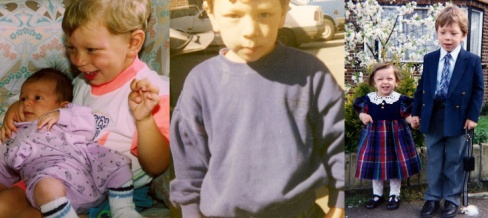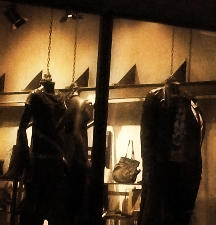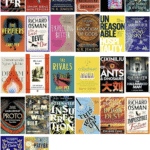In the past week or so, I have, in no particular order:
- Clapped for Tasha at tonight’s certificate evening at QPCS
- Laughed lots as Ms. [censored] bitched about Mr. [censored] afterwards: “he’s brainwashing the children!”
- Seen the slightly weird but worth watching Waltz with Bashir with mum, and eaten ice-cream as I did so (naturally)
- Bought lots of Christmas presents without leaving my desk (I’m not saving Woolies, sorry)
- Got a lovingly-branded Christmas card from Nic. Merry Christmas back!
- Nasally asked Sanna for “more fire please” (because… oh, never mind) whilst admiring the fact that her kitchen table is always covered in tasty snack food
- Really enjoyed the resumption of Book Club
- Gorged on a double bill of Merlin with Oliver and Abi whilst also greatly admiring his provision of food (I do just go around eating other people’s food, don’t I?)
- Uploaded some newly scanned old photos of mine onto Facebook – but a taster for the Facebook-deprived now follows…

The camp, the ‘working class Northern’ and the suited
Obviously, my next blog will be back to its emotional and reflective self ![]()
Flashback
Prompt: Abbi’s post, obviously.
Characters: John Smith and Adeline Worsley
Timeline: 1870
Author’s comments: When you have lots of things to do I find it always helps to do something entirely pointless as a distraction. Sorry, Abbi!
Speaking candidly, I was drawn to Adeline from the very moment Lady Walton introduced her that afternoon at Cofton Hall. A more speculative man than myself might even attribute Adeline’s presence to the eventual outcome of my decision as to whether to accept Lady Walton’s kind offer of a summer residence. The issue did not weigh heavily on my mind, however, and the last thing I would wish would be for you – dear reader – to presume my intentions, as far as they can be spoken of at all, were anything less than fully chivalrous. Adeline’s company was simply an attraction in itself. Cofton Hall was a fine building with a great many servants and visitors but I did not come to socialise a great deal aside from mere formalities. The character of the house, for all of its warmth and charm, encouraged a rather private atmosphere which I did not think to broach.
It would not be admitting too much to suggest that my circle of acquaintances in the surrounding area was not an expansive one. Although my father was by now a wealthy merchant I had spent my formative years in the provinces and struggled to acquaint myself with the ways and customs of the people whose company I was now so graciously invited to keep. Adeline was as yet unmarried. And so I venture to suggest that we quickly formed a lasting bond. We spent nights sitting by the fire and taking turns to recite each other’s most treasured poetry: Wordsworth for me, Coleridge for her. Our discussions, although naturally bounded by common decency, encompassed the greatest variety of topics. She discussed her past suitors, her father’s occupation, her desires to one day make a voyage to the British Raj and indeed perhaps even permanently settle there, for she so hated the English weather. Not having any experience of courting I instead regaled her with domestic tales of my thirteen brothers, life in the provinces, and my displeasure at having to work for one of my father’s businesses.
My innermost thoughts remained hidden even to my eyes, however, until one evening when we accompanied Lady Walton to dinner at Lady Chatterley’s residence. We didn’t frequently venture on such journeys but that afternoon Adeline had arrived back after one of her regular walks around the house’s expansive grounds and declared that she was quite minded to accept Lady Walton’s offer for us to join her in some good company. Adeline proceeded to excuse herself from my company for several hours to prepare herself, humming sweet songs and later descending the staircase in a manner I had not previously witnessed. Her hair had been brushed to a most exquisite texture and she was wearing a most elegant gown which strenuously flattered and enhanced her womanly beauty. We exchanged smiling glances and boarded our carriage to Lady Chatterley’s. That night all we spoke merrily and even indulged in a spot of good-natured banter. And yet it was clear to me that Lady Chatterley’s son, a gentleman whose name escapes my memory but whose poor constitution and wicked tongue attracted my deepest scorn, was himself rather taken with Adeline. I felt a sharp pang of jealousy in the very core of my being. Perchance this sensation was a novel one because I had not formerly had to endure a mere portion of Adeline’s attention. Nevertheless, as we departed I took pains to ensure that Adeline was seated comfortably in her carriage for the journey home and felt a surge of pleasure when she rewarded my efforts with a fleeting smile of appreciation.
To this day I am at a loss to explain why I failed to announce my intentions honourably and seek her hand in marriage. One might suggest I was afraid: less so of her declining to accede to my request than fear of the most terrible consequences that could arise from seeking a wife of too high a status. I was well aware that these ill-matched couplings were not destined for success: it was widely acknowledged and accepted. It was a central organising principle of British society. Nevertheless, Adeline continued to occupy my thoughts, and the manner of my idle fantasies began to evolve into sin. Every time she played a finely judged hand in a game of cards or bade me goodnight, my heartbeat would quicken and my breathing became more and more difficult to sustain at a regular level.
Whilst I regret I am unable to be more specific in my recollections, it would have been close to a month after that evening at Lady Chatterley’s when Adeline and I found ourselves simultaneously searching the pantry for sustenance. It was a Saturday and the sun was shining brightly in the sky. In our minds, however, no diversions were proving suitably involving to alleviate a certain boredom.
“Mr. Smith, I must say that I am quite at a loss to think of any suitable entertainments to-day,” said Adeline.
“We might pay a visit to the theatre?” I suggested, preparing some oats.
“To my mind the theatre has quite exhausted all opportunities for diversion.”
“In which case, what do you suggest we pursue?”
“I have the answer,” she exclaimed quite excitably. “Let us venture on a railroad journey!”
“A railroad journey? One cannot reach the extremities of the parish of Willesden before one is confronted with an unexpected delay or inconvenience.”
“Notwithstanding such objections, Mr. Smith,” she said, reaching our hand in a gesture of solidarity – at which point I was quite unable to except her pale, slender hands from my amorous gaze – “we do not have to venture any distance of great proportions. I could ask my maid to pack us some provisions and we could pay a visit to those fabulous gardens just north of the county of Middlesex!”
You shall not be surprised to discover that we did indeed embark on this venture. Naturally, I was far too enraptured with Adeline to turn down any suggestion she may have had. In addition, it shall raise not the smallest glimmer of astonishment from readers familiar with England to learn that our railroad journey was thrice interrupted by mechanical failures. I have heard it said that the British railroads are the finest in all the world but in actuality it is not long until one is rendered quite distressed by its many inadequacies. Adeline entreated a guard to make a hasty enquiry as to the cause of our most recent delay and we returned to our carriage to wait. And indeed, as with that singular moment after our visit to Lady Chatterley’s, she gave me a small smile which betrayed a sense of natural affinity.
“You are quite the ideal companion for such a moment, Mr. Smith,” she confided.
I knew that the Lord himself could not have ordained a more perfect moment and so as our gazes met I leaned forward and planted a kiss upon her cheek.
Her face aghast, she turned her head away and struck my face in anger. “By all that is holy!”
My mind was as blank as a fresh piece of parchment and I attempted to stammer an explanation.
“I was under the impression that you were a man of the cloth!”
“A man of the cloth? What possible sources could exist for you to have contrived such a preposterous fiction?”
“In all of our discussions you have never brought the topic of your affections to light, and furthermore I must confess that you do indeed seem to be…”
“To be? State your conclusions, Adeline?”
“Pious!”
“I did not express interest in a life of chastity either,” I said. “Your analysis of my character was inescapably flawed.”
At that moment the carriage shook into life and by some miracle the train began to reverse upon the route on which it had come.
“I can only suggest we return home,” she said.
“I can only concur,” I replied sourly.
Inner
Inner city
Inner city pressure
Inner city pressure
Counting coins on the counter of the 7-11,
From a quarter past six ’til a quarter to seven,
The manager Bevan starts to abuse me
Hey man, I just want some Muesli
– Inner City Pressure, Flight of the Conchords (I love these guys at the moment! This is my favourite so far.)
So I’m back home! And I find it quite telling that so far I have managed to go on a PC World spending spree – not spending my own money, you understand – and eat 4 days’ worth of advent calendar chocolates without yet unpacking my clothes or making my bed. Priorities in place: check. Next? Well, it would actually be really great if all of my London friends could think long and hard about whether they’ve got any long-harboured grudges against me which they’d like to get off their chests.That why I could be a loner and have more time for coursework, see? So think long and hard about it, please, and (don’t) get back to me if you think of anything.
The last couple of days of term were great fun, unless you were Michael trying to get to sleep above my room at 2am on Thursday night whilst the rest of us rather raucously judged each others’ music tastes with plenty of shouting and singing, not to mention beer and Peggle. Oops. Sorry. Friday night was more peaceful, to be fair, as we watched Doctor Zhivago into the early hours. Although it was rather long I was in exactly the right mood for a film to take its time and really enjoyed it. It is quite difficult to stop yourself adding “comrade!” onto the end of every sentence you say afterwards though ![]() The other highlight of the final few days was seeing Promise again; she was in a particularly inspiring mood and filled with stories that make you appreciate what is right with the world. So yay!
The other highlight of the final few days was seeing Promise again; she was in a particularly inspiring mood and filled with stories that make you appreciate what is right with the world. So yay!
~
Tonight’s Wit and Wisdom is a topical one…

The Wit and Wisdom of My Mates And I: Part 4
Part 4: On London
“When I arrived in London, I am sorry to say the voice of conscience was again stifled. As the train drew up on the platform, I jumped out with the glad feeling, “I am here at last.” I was very stiff, dizzy and tired with my long journey; but there was no time to think about it. I was pushed from side to side. Men with boxes, omnibus conductors, cab-drivers, guards, passengers running madly after their luggage – all perfectly bewildered me. […]
“What is the matter, Jack?” said I. “What is going on? Is it a fair?” But Jack laughed so much at this question that it seemed as if he would roll off the omnibus. “Why, Charlie,” said he, “it’s always like that.” “Always like that?” repeated I. “Yes,” said he, “always in these parts of London.” I was too much astonished to answer, and only gazed around curiously on all we passed.”
Spookily, the BBC have done a big feature on ‘community’ a day or so after Sanna raised the issue on her blog and prompted much discussion. Off the back of this Lucy notes that she’s now from the North. But I want to expression confusion at the central premise behind all this, as summarised by the BBC’s Mark Easton:
In particular, the study focuses on the concept of “anomie”, a measure of people’s sense of – or lack of – belonging to where they live.
So?
Perhaps we’re forgetting that ‘belonging’ to a geographical location is just as imagined a community as any other. Perhaps it would be possible, theoretically, to actually know and interact with everyone on your street or in your small village. But there’s no way this can be plausibly extended to even fairly small regions: I may feel I ‘belong’ to Willesden, Brent or London, but it’s just that: a feeling within me. And whilst it’s probably obvious to most people that we need to feel we ‘belong’ to some sort of community – or communities – why does it need to be geographic?
In fact, I would argue that to place the focus on geography is profoundly limiting. Not only does it creates needless tension against immigration but – ultimately – isn’t it lonelier to be restricted to a far smaller pool of people in which to find others who share interests, outlooks and activities? Transport, urbanisation and communication – especially online – provide the tools to overcome the harsh limits of geography whilst providing for all-important real world interaction. Does this mean that people and families are less committed to their immediate neighbourhoods leading to a suffering in community life, as Easton suggests? Well only if you equate ‘immediate neighbourhoods’ with ‘community life’ it does. But if the evidence is that immediate neighbourhoods are less important to people than previously then why is this such a problem?
(Incidentally, if you’re looking for causes as to why this is supposedly* happening, may I draw you away from the wild conspiracies floating around and – for once – suggest that class is actually a pretty relevant factor. Research suggests that the middle class tends to maintain a more diverse range of close contacts from different areas of life – school, university, work, random-guy-I-met-online and so on – and it’s hardly news to suggest that recent decades have seen a big expansion of the middle class.)
*I say ‘supposedly’ because you could probably have written this story at any point over the past couple of centuries.

Racial tensions at Cambridge’s Grand Arcade

(Bad enough by themselves)
Well, it mildly disturbed me anyway.
Credit: Lucy for suggesting that it should be photographed.








